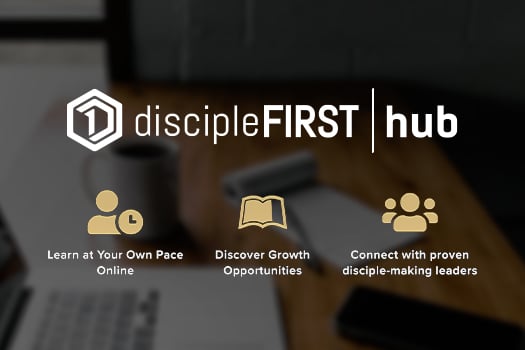The second phase in Jesus’ disciple-making process was to call people to a commitment and connect them with other believers. After his rejection in Nazareth, Jesus relocated his ministry base of operation to Capernaum, a thriving city on the north shore of Galilee. During this time, John the Baptist was arrested by Herod Antipas.
The call of Jesus
Jesus stepped into the vacuum of leadership and began preaching to the crowds that had been following John. Jesus also started preaching the simple message “repent and believe” (Matthew 4.12-17). It was also at this time that Jesus intentionally raised up a small group of emerging leaders.
One day, Jesus walked along the shore of Galilee and saw Peter and Andrew tending to their fishing nets. He called out to them and said, “Follow me and I will make you fishers of men.” These men dropped everything and followed Jesus. Then he walked down a bit further and saw James and John working with their father, Zebedee in the fishing boats and he called to them too, and they left it all to follow Jesus (Matthew 4.18-22).
What’s happening here is a big deal. Up to this point these men had been following Jesus, but they had not made a life-altering commitment to Jesus. They had observed him, listened to him, even marveled at him for the past year and a half, but they had not fully committed to him. Their lives had not been substantially altered, but that was about to change. Jesus called them to “follow him.” This is what Dr. Wilkins describes as the “call of Jesus.”
“While the movement around him ebbed and flowed, Jesus’ call established the high-tide mark for his form of discipleship. That call must be understood within the broader biblical concept of “calling” because it is a call that demands a decision of life commitment from those who are curious. The call focused people on making a commitment to Jesus, summoning them to place their unreserved faith in him as the One coming with the proclamation of the kingdom. The call at this stage meant commitment to Jesus personally. It also included some sense of joining with Jesus in his announcement that the kingdom of God had arrived.”
When Jesus called these four men, He was asking them to make a commitment to Him. He was asking them to leave what they had known before and follow Him. He was asking them to trust Him to provide for them, trust Him to lead them, and trust Him to use them for a greater purpose.
He said, “follow me,” and they followed him. From that point on, they were seen as Jesus’ disciples. They publicly identified with Jesus. They lived in community with each other. They joined Jesus in his ministry. Over the next six months, they shadowed Jesus as he traveled, preached, and healed.
Jesus was doing all the heavy lifting, but they were with him—helping him and watching him. They watched him cast a demon out of a man (Mark 1.21-28) and heal Peter’s mother-in-law, as well as the thousands who flocked to Jesus for help (Luke 4.38-41).
While fishing, they dropped their nets at Jesus’ instruction and saw him orchestrate the largest catch of fish they had ever seen, proving that he was more than able to care for their needs (Luke 5.1-11). They saw Jesus heal lepers (Luke 5.12-16), forgive the paralytic (Luke 5.17-26), reach out to tax collectors (Luke 5.27-32), and wrangle with the religious legalists who loved external compliance with the law more than people (Luke 5.33-39, 6.1-5).
They also heard Jesus make bold declarations about Himself, such as, “The Father loves the Son and shows Him all things that He Himself is doing and greater works than these will He show Him, that you may marvel. For just as the Father raises the dead and gives them life, even so the Son also gives life to whom he wishes” (John 5.20-21). And, “Truly truly I say to you, he who hears my word and believes in him who sent me, has eternal life and will not come into judgment, but has passed out of death into life” (John 5.24).
Calling people to commitment
For a church to have a disciple-making strategy, they must not only share the gospel and help people find answers to their questions, but they must also call people to a commitment to follow Jesus.
The curious cannot remain so forever. At some point, they must decide if Jesus is worth following or not. Those who do choose to follow Jesus must be connected to the community of believers. At our church, we talk about helping people make the four-point connection. Our goal is to help people that attend services on the weekend make four life-altering commitments.
First, we want them to connect with Christ by placing their trust and faith in Jesus. Just as Jesus made his disciples “cross the line” of commitment, every week we encourage seekers to make a decision to follow Jesus.
Second, we want new believers to connect with the church. Jesus called his disciples to publicly identify with him. This connection to the church happens through public baptism as well as attending our church membership seminar.
Third, we want new believers to connect in a community. Jesus’ disciples lived in community, and we want new believers in our church to do the same. This happens when they get plugged into a group where they can make lasting friendships, study the Bible, learn more about Jesus, and find the nurture and care they need.
Fourth, we want new believers to connect with a cause. Jesus began to engage his men in ministry, even if it was at the entry level. We want to help people find some way to serve in the life of the church. It could be passing out coffee or greeting people as they enter the worship center. It could be expressing their gifts in other ways.
But we want everyone to have a place to serve and a way to contribute to God’s cause. We think of these four vital connections like four legs of a chair. If someone is balancing on one leg it is not very stable. Two legs are better, but still tenuous. Three legs (if that were possible) would be okay, but not as good as having all four legs squarely on the ground.
The people who are fully connected
The people who make all four commitments: to Christ, to the church, to a community, and to a cause are the people we say are fully connected and are ready to take the next step. Since it’s our desire to move people from the crowd on Sunday into vital connection, we promote these four connection points strategically and frequently. We tell stories of people who made one of these commitments. We show video testimonies. We challenge people to take the next steps and celebrate them when they do. We try to remove the barriers that would keep people from making these commitments. We pray for God to move in their hearts.
This blog features an excerpt from one of our books, Bold Moves.







